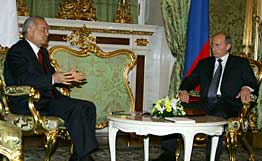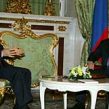
PUTIN PLEDGES TO BACK UP KARIMOV IN A CRISIS
Publication: Eurasia Daily Monitor Volume: 2 Issue: 214
By:

Russia and Uzbekistan have formally signed a new military alliance agreement with far-reaching consequences for bilateral relations between the two states and for Central Asia. Russian President Vladimir Putin invited Uzbek President Islam Karimov to Moscow in order to sign the treaty on November 14.
According to the treaty, the Russian military may some day be deployed to military facilities within Uzbekistan in the event of a national crisis and with Tashkent’s approval. These arrangements denote the culmination of a lengthy process of reorientation toward Russia pursued by the Karimov regime, revealing the extent to which the seemingly pro-Western country is turning away from transatlantic security options and assistance (Interfax, November 14, 15; Itar-Tass, November 15).
The treaty grants an unprecedented level of military cooperation between Russia and Uzbekistan, aiming to follow through on the practical cooperation attained in September when the two countries held their first bilateral military exercises for several years. The text reads, “In order to maintain security, peace, and stability the sides grant each other, in cases of need and on the basis of separate treaties, the right to use military facilities located on their respective territories.” This is justified on the basis of: “taking account of the high level of military and military-technical cooperation attained on the basis of existing treaties, the sides are actively cooperating in the modernization and reform of the armed forces, in providing them with up-to-date armaments and military hardware, in raising their combat readiness, and also in other related areas of mutual interest.” In other words, Moscow regards existing bilateral agreements as essential underpinning for the new treaty, downplaying the prospect that Russian servicemen may be deployed in the country (RIA-Novosti, Moscow, November 14). In reality, however, behind the diplomatic niceties many analyst and security officials in Moscow are already talking openly of a Russian military base in Uzbekistan; most likely sometime after the U.S. military vacates the Karshi-Khanabad base. Significantly, the treaty contains a provision for Russia opening a military base in Uzbekistan (Kommersant, November 14).
Tashkent withdrew from the post-Soviet Collective Security Treaty in 1999, disgruntled by the inadequate level of security support from Moscow. Now, on the basis of this new bilateral treaty, Tashkent hopes to secure a stable source for reforming and modernizing its ailing military and security structures, without the entanglement of debating its human rights record and progress on democracy, which has been a feature of its difficult relations with the West. Implicit in the terms of the treaty is the potential for Russian military involvement in the internal affairs of Uzbekistan should there be any threat to the Karimov regime. Given Russia’s recent experience of involvement in small wars on its periphery, it seems difficult to imagine that the Kremlin wants to become embroiled in a messy civil conflict.
Yet the message from Moscow is clear: in the event of a crisis Uzbekistan should look first and foremost to Russia. Sergei Karaganov, a political scientist and chairman of the Foreign and Defense Policy Council, described the prospect of a future Russian military base in Uzbekistan as a stabilizing factor that would deter conflict and strengthen the Uzbek regime, whether that is Karimov or a successor. A small, token military presence would symbolize Russia’s interests in stabilizing the situation in the country. Karaganov believes that this is not intended to affect the United States since, he argues, both Washington and Moscow are equally afraid of the security implications of a sudden change of government in Uzbekistan (Ekho Moskvy Radio, November 14).
Putin has thus taken a calculated risk in his ongoing campaign to restore Russia’s influence in Central Asia after the deployment of U.S. and Western military forces into the region in 2001 in support of Operation Enduring Freedom. Reaction to that gamble is already mixed within Moscow, and it remains to be seen as to how the treaty will be utilized as the basis for a Russian military base on Uzbek territory. Karimov, however, may calculate that he gained an enhanced level of security through the American military presence in Uzbekistan and could similarly benefit from a more durable and less politically risky Russian deployment. But the existence of the new treaty makes more complex the formulation of policy in Washington and other Western capitals, since the resurgence of Russia as a security guarantor in the region, offering cheap arms and military training without placing democratizing goals on the host regime, will be hard to compete with.
The most crucial factor is likely to be whether the Moscow-Tashkent axis will remain unique or herald the start of a process among the Central Asian countries to seek more favorable terms for security assistance and crisis management from Moscow. As these processes unfold, Putin will await reaction from Washington, probably banking on greater respect for the role played by Russia in stabilizing Central Asia.




